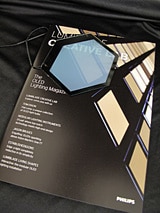Ludwigshafen and Eindhoven – BASF and Philips have achieved a practical breakthrough in the development of OLED (Organic Light Emitting Diode) technology that allows it to be integrated in car roofs. The OLEDs are transparent when switched off, allowing for a clear view outside the vehicle, yet providing light only within the vehicle when switched on. This OLED lighting concept for car roofs is the result of a longstanding cooperation between BASF and Philips in the research and development of OLED modules.
In addition to offering completely new design possibilities, the transparent OLED lighting concept also allows new approaches to automotive engineering. The transparent OLED sandwich structure can be combined with equally transparent solar cells.
“This combination allows the driver to enjoy a unique open-space feeling while it generates electricity during the day and pleasantly suffuses the interior with the warm light of the transparent, highly efficient OLEDs at night,” said Dr. Felix Görth, head of Organic Light-Emitting Diodes and Organic Photovoltaics at BASF Future Business GmbH.
Dr. Dietrich Bertram, General Manager of OLED Lighting at Philips, added: “This project provides impressive evidence of new possibilities with OLEDs, and illustrates the potential of Philips’ Lumiblade OLED technology to help create innovative lighting applications that enhance people’s lives.”
BASF and Philips have cooperated closely since 2006 within the OLED 2015 initiative of Germany’s Federal Ministry of Education and Research (BMBF). BASF develops organo-chemical materials such as dyes that are used in the development and manufacturing of OLEDs by Philips. Working together, the two partners put the innovative transparent OLED lighting technology into practice on a car roof.
OLED – a lighting revolution
OLED technology offers the advantage of high energy efficiency, in addition to creative flexibility and new options for designers. OLED light sources are just 1.8 millimeters thin and can be transparent. The entire surface of an OLED illuminates with diffused light, making it a very soft light source that produces less harsh shadows compared to point light sources.
BMBF’s OLED 2015 initiative
The joint “TOPAS 2012” project was launched in January 2010, marking the second phase of the BMBF’s OLED 2015 initiative. “TOPAS” refers to “thousand lumen organic phosphorescent devices for applications in lighting systems.” In this project, the consortium partners (which include BASF and Philips) will focus on developing innovative materials and component architectures as well as new production machines for lighting solutions with highly efficient organic light-emitting diodes.
For media resources please visit:
www.basf.com/news
www.newscenter.philips.com

 Philips' OLED module for car roof lighting concept developed with BASF is transparant when switched off.
Philips' OLED module for car roof lighting concept developed with BASF is transparant when switched off. Transparent OLEDs are still in the research phase. Philips is leading research in this area and is the first to demonstrate transparent OLEDs in an application environment such as the car roof lighting concept with BASF.
Transparent OLEDs are still in the research phase. Philips is leading research in this area and is the first to demonstrate transparent OLEDs in an application environment such as the car roof lighting concept with BASF.